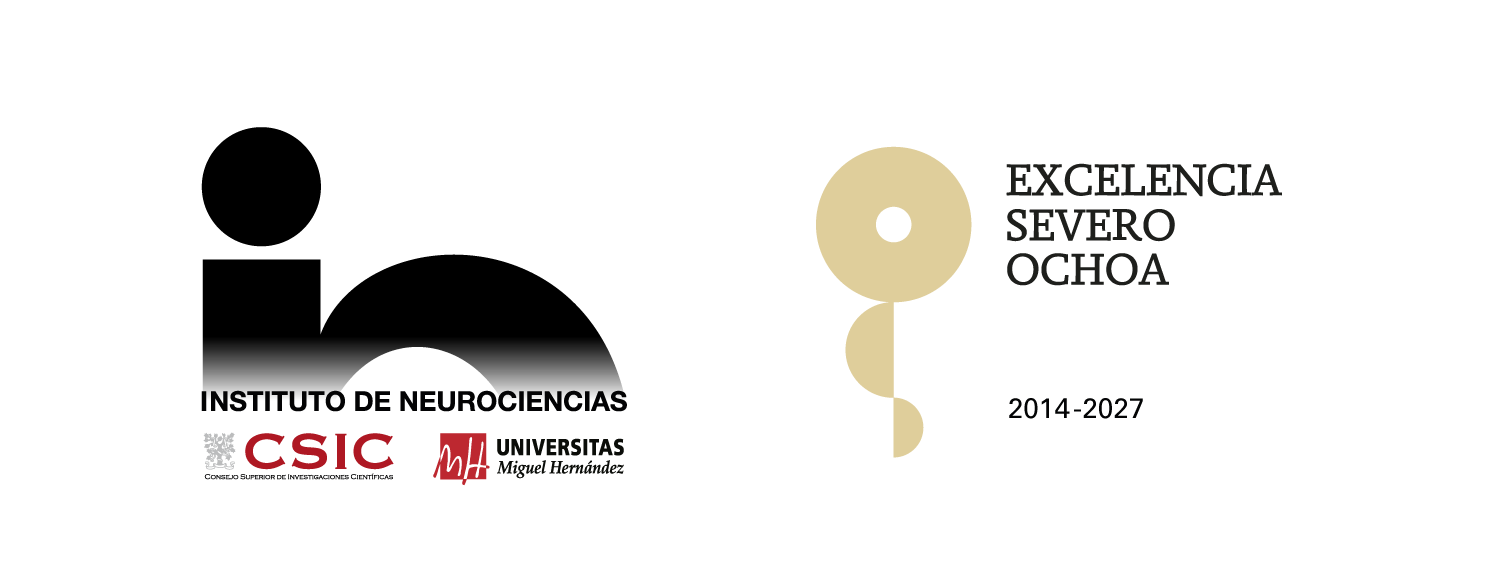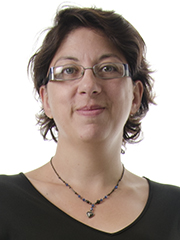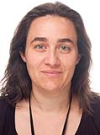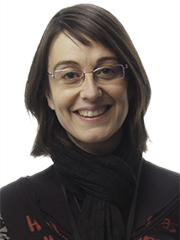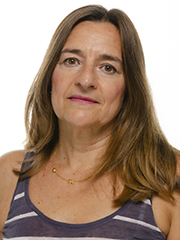The Cell Culture and Sterilization Unit is the Insituto de Neurociencias Service that provides researchers the environment for getting healthy viable cell cultures. This Service is composed by three different and spatially separated Areas in order to carry out different types of cell cultures: Cell Lines, Primary Cultures and Organotipic Cultures.
Each of these facilities are well equipped with class I and/or class II laminar flow cabinets, incubators, inverted phase contrast and fluorescence microscopes and all the material necessary to perform specialized cell culture techniques. Bio-safety level 2 areas are included to work with high risk material (human samples, virus).The Unit also have available a new generation system for real-time quantitative live-cells analysis.
Services offered:
- Technical advice for culturing a range of different cell types.
- Training and technical assistance in cell culture protocols and in the use of all the devices and equipment provided in the Facilities.
- Mycoplasma analysis for all the cells to guarantee they are free of contaminants.
- Frozen cell stocks conservation in liquid nitrogen.
- Equipment and devices maintenance.
- Media and pre-culture material preparation and sterilization.
Cryopreservation and water purification system of the Cell Culture units:
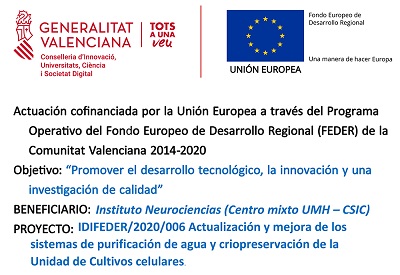
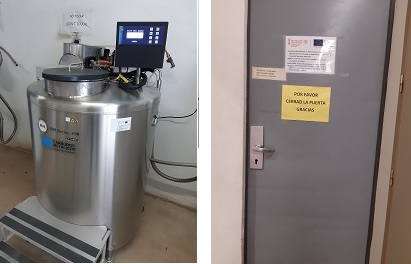
General operational considerations of the Cell Culture and Sterilization Unit:
- 1. Cell Culture Areas are highly specialized zones so people crowds will not be allowed.
- 2. The Principal Investigator is ultimately responsible for the correct use of the Facility’s equipment by any member of his/her team.
- 3. All users must contact with the Unit Supervisor to obtain the authorization in order to work in the Unit.
- 4. It is mandatory for new users to receive the corresponding training before working in the Unit. Furthermore, during the first session they should be supervised by an experimented user or the Facility’s personnel.
- 5. Users must read and be aware of the basic instructions for the correct use of each equipment he/she manipulates, as well as for the rules applicable in each case.
- 6. Biosafety cabinets and equipment will be always booked through the established system.
- 7. If a booked session is not going to be used must be cancel.
- 8. Any user booking a slot is responsible for the equipment he/she uses, and has to kept clean and tidy the area after finishing.
- 9. If you have any doubt regarding the use of any equipment ask for help to the qualified personnel.
- 10. General communication, questions and bookings modifications will be preferably stablished by e-mail to: in.cultivos@listas.umh.es
CELL CULTURES 237 -BOOKINGS-
Team bookings; magnifying glasses, fluorescence microscope (in case of long times), dissection and culture rooms, will be carried out through the intranet of the Institute of Neurosciences:
Intranet
Incucyte can be booked one month in advance through the intranet. It is possible to reserve the equipment for several users at the same time, but for this they must contact to manage the reservations with: svega@umh.es
Table 1: Prices List (in €)
| Services | IN-UMH-CSIC | Public Org. | Private Org. |
Technical support and formation (h) |
27,6 € | 55,2 € | 82,8 € |
Cabinet use (h) |
20 € | 40 € | 60 € |
Mycoplasma test (sample) |
7,5 € | 15 € | 22,5 € |
Cryopreservation in N2 (box/month) |
2,5 € | 5 € | 7,5 € |
Media preparation and aliquots (h) |
14 € | 28 € | 42 € |
*prices without VAT.
Cell Culture Unit is distributed in three main areas according to the culture type that will perform:
Room 237. Primary Cultures
- Preculture area
- Fluorescence microscope dark room
- Culture room 1. Long term cultures and Live-cell image acquisition (Incucyte)
- Culture room 2. Primary cultures preparation
- Culture room 3. Primary cultures preparation
- Culture room 4. Biohazardous cultures (human samples, virus infections)
Room 129. Cell Lines
- Culture room 1. Biohazardous cultures (human samples, virus infections) and fluorescence microscope
- Culture room 2. Quarantine area
- Culture room 3. Stem cell cultures
- Culture room 4. Cell lines maintenance
- Preculture area
Room 111. Organotipic Cultures
- Preculture area
- Culture room 1. Organotipic cultures preparation
- Culture room 2. Biohazardous cultures (human samples, virus infections)
Cryopreservation Area (shed in the loading dock)
- Manual filling containers (three)
- Automatic vapor phase container
General communication, questions, appointment inquiries, and training requests will be preferably set up by email to: in.cultivos@umh.es
Cell Culture and Sterilization Unit is provided with all the equipment needed to perform all the different types of cell cultures: Primary, Organotypic and Cell Lines cultures.
We have the following equipment distributing throughout the different Areas:
• Vertical flow cabinets (lab 111, 129, 237)
Biological safety cabinets to obtain delimited areas of clean and sterile air with recirculation of 70% of the air volume. These can be used when it is necessary to ensure the absence of contamination of the product during its manipulation. It provides a high protection of the operator and the environment.
• Horizontal flow cabinets (lab 111, 237)
Horizontal laminar flow cabinets when it is necessary to ensure the absence of contamination of the product during its manipulation, not being necessary to protect the operator and the environment. Examples: primary cultures free from pathogens.
• Incubators (lab 111, 129, 237)
Incubators with a strict control of both, temperature and CO2, to provide optimal growth conditions for cell cultures of different nature. All have self-sterilization programs to ensure their correct cleaning to avoid any kind of contamination.
• Microscopes (lab 111, 129, 237)
Inverted microscopes to observe cell cultures by fluorescence and bright field illumination. Fluorescence microscopes have filter cubes for DAPI, GFP and RFP and dry objectives of, 10x, 20x and 40x, and there is one per area. Those in labs 129 and 237 have coupled cameras to monitor the cultures.
• Stereo microscopes (lab 111, 237)
Several stereo microscopes are available to dissect tissues in order to stablish Primary and Organotypic cultures.
• Centrifuges (lab 111, 129, 237)
Refrigerated centrifuges with swing-bucket rotor for 15 and 50ml tubes, and centrifuges with fix rotor for 1,5 and 2ml.
• Vibratome (lab 111)
Vibrating blade microtome Leica VT1000S to obtain sections from fresh tissue to culture it.
• UV sterilizer (lab 111)
Equipment to sterilize, throug UV, surgical and small material necessary to stablish primary cell cultures.
• Water baths (lab 111, 129, 237)
To warm culture media and solutions.
• Fridges and freezers (lab 111, 129, 237)
To preserve media and solutions necessary for cell cultures maintenance.
• IncuCyte system (lab 237 room 1)
Live-cell imaging acquisition equipment that enables automated quantification of cell behavior over time, and it includes a platform to analyze different cell functions (proliferation, migration, apoptosis, proteins internalization, etc). In vivo images can be taken both in bright field and fluorescence (DAPI, GFP and RFP).
https://www.essenbioscience.com/en/resources/incucyte-zoom-resources-support/
• Cryopreservation containers (loading dock)
The Unit has liquid nitrogen containers to keep our cell lines in optimal conditions during time.
One vapor phase container (automatic filling) and three in liquid phase (manual filling) are available.

 Español
Español